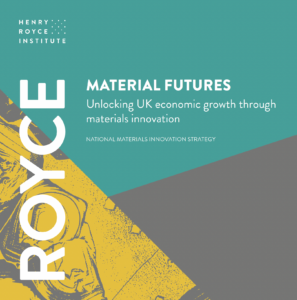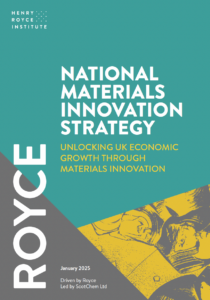The National Materials Innovation Strategy

Read the Executive Summary
This booklet summarises the full strategy.
Read Material Futures to understand more about the advancements so urgently required for our modern world and underpinning our aspirations for a sustainable future. The executive summary features a number of case studies to showcase the incredible opportunities Materials Innovation is already presenting for UK infrastructure.

Read the Full Strategy
This National Materials Innovation Strategy represents a truly significant milestone. It is the output of extensive collaboration with the UK’s strategic sectors. It brings together the insights of materials science, engineering researchers and innovators, policymakers, and industrial leaders in a unique manner - addressing national priorities and assimilating knowledge of markets in a top-down approach.
Strategy Goals
The main goals of the National Materials Innovation Strategy are:
- Accelerate Innovation: Create pathways to speed up the journey from discovery to deployment, breaking down silos between industry sectors and scientific disciplines.
- Economic Growth: Drive economic growth by leveraging materials innovation, contributing significantly to the UK economy and creating high-skill employment opportunities.
- Sustainability and Resilience: Address the necessity of sustainability and resilience in new discovery and innovation processes, contributing to a net zero economy.
- Tackle Major Challenges: Use materials innovation to address pressing challenges such as decarbonising energy systems, revolutionising healthcare, and boosting the circular economy.
- Leverage Existing Strengths: Utilising the UK’s world-class research and development capabilities, its regulatory environment, and highly skilled workforce to drive impactful materials innovation.
- Create a Cohesive Framework: Develop a consistent and cohesive framework to address common opportunities and challenges across various sectors.
- Support High-Value Industries and Attract Investment: Focus on high-potential investment opportunities and support high-value industries through demonstrable, high impact materials innovation.
- Promote Collaboration: Foster collaboration among industry leaders, academic specialists, government experts, and other stakeholders to drive materials innovation.
- Global Leadership: Strengthen and extend the UK’s global leadership in materials science and innovation.
These goals aim to transform materials potential into materials progress, ensuring the UK remains a global leader in materials innovation.


More than ever materials innovation has to be accelerated in the UK if it is going to deliver against the needs of major challenges such as net zero, health improvements, sustainable use of resources and, of course, underpin a robust economy."
Professor David Knowles, Royce CEO
Key Contributors
The key contributors include:
Materials Leadership Group: Led by Allan Cook CBE and Professor David Knowles, this group comprises national leaders in materials innovation.
Henry Royce Institute: Initiated the development of the strategy and coordinated the collaboration among various stakeholders.
Industry Leaders: Over 270 different businesses, including many of the UK’s major corporates making or using materials within their businesses.
Academic Experts: Contributions from world-class universities and research organisations.
Government Experts: Involvement from policymakers and government bodies.
Non-Governmental Bodies: Participation from various non-governmental organisations.
Over 2,000 Experts: Engaged through workshops and consultations to provide insights on market opportunities, innovation solutions, and investment needs.
These contributors worked together to identify key materials innovation opportunities and develop a cohesive strategy to drive economic growth and address pressing societal challenges.




